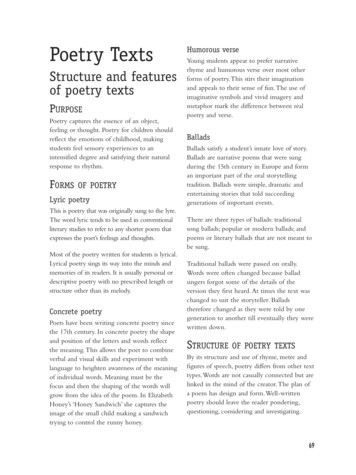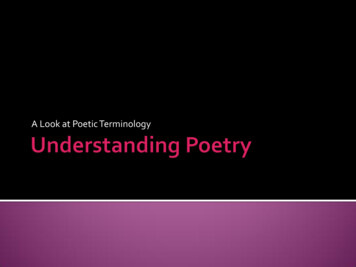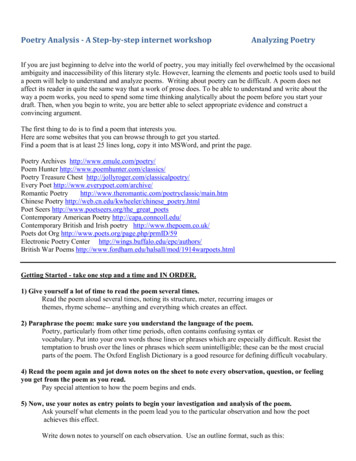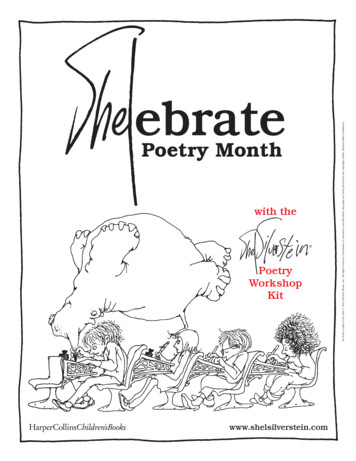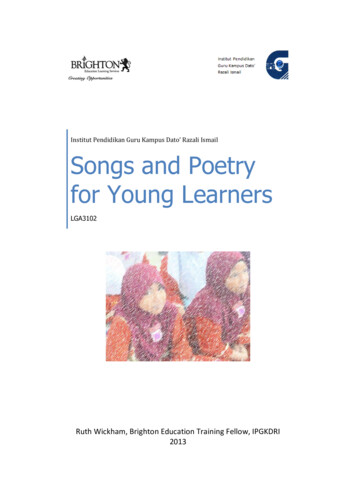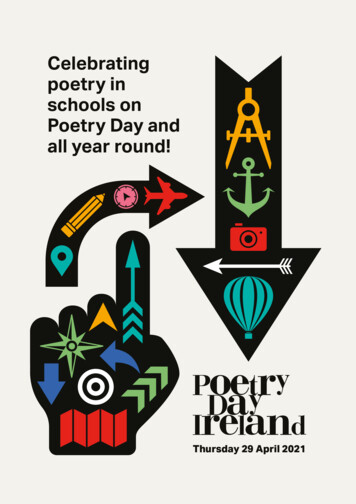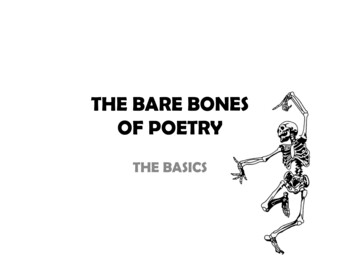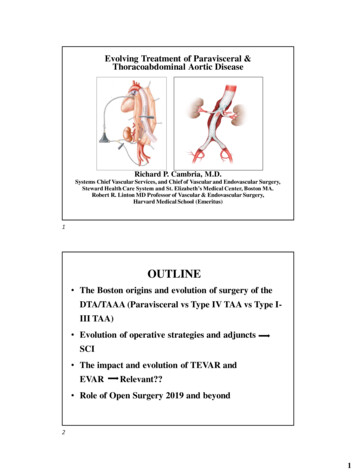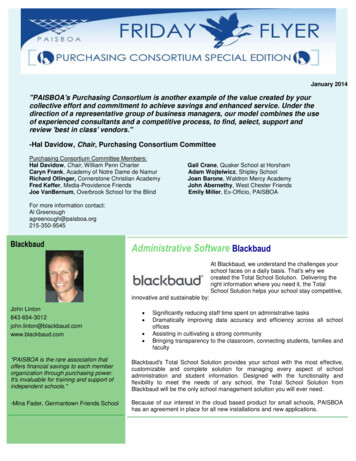
Transcription
LINTON K W E S I JOHNSON:POETRY DOWN A REGGAE W I R EbyRobert J. Stewartfor "Poetry, Motion, and Praxis: Caribbean Writers" panelXVllth Annual ConferenceCARIBBEAN STUDIES ASSOCIATIONSt. George's, Grenada26-29 May, 1992
LINTON KWESI JOHNSON:POETRY DOWN fl RE66flE W I R ELinton Kwesi Johnson had been writing seriously for about four years when his firstpublished poem appeared in 1973. There had been nothing particularly propitious inhis experience up to then to indicate that within a relatively short period of time hewould become an internationally recognized writer and performer. Now, at thirty-nineyears of age, he has published four books of poetry, has recorded seven collections of hispoems set to music, and has appeared in public readings and performances of his work inat least twenty-one countries outside of England. He has also pursued a parallel careeras a political activist and journalist.Johnson was born in Chapelton in the parish of Clarendon on the island of Jamaica inAugust 1952. His parents had moved down from the mountains to try for a financiallybetter life in the town. They moved to Kingston when Johnson was about seven years old,leaving him with his grandmother at Sandy River, at the foot of the Bull Head Mountains.He was moved from Chapelton All-Age School to Staceyville All-Age, near Sandy River.His mother soon left Kingston for England, and in 1963, at the age of eleven, Lintonemigrated to join her on Acre Lane in Brixton, South London.1The images of black and white Britain immediately impressed young Johnson. On onehand, the Caribbean spirit of Brixton market, the sounds of his own Jamaican nationlanguage, and the similar experiences of his young black schoolmates, also recentimmigrants, provided something of a welcoming milieu. Simultaneously, he was joltedby the ugliness of the urban chimney-scapes, by the vision of white men sweeping thestreets, and, crucially, by the racism exuded by white students and teachers at the TulseHill Comprehensive School in L n d o n . Johnson could have become the type of rebel youth that he was later to write aboutwith such insight-striking out against the most immediate and visible aspects of racialoppression, with little political consciousness beyond the unreflective expression of adiffuse rage, ultimately self-destructive.In his final year of secondary school,however, he was deflected from this course when he became aware of, and joined, theyouth section of the Black Panther Party of England.Initially, the comradeship,discipline, and ideological training he acquired in the Panthers all provided a political
channeling of his energies which he perhaps could not have achieved on his own. Moreimportant for his mind and spirit was his discovery in the Panther library of a bookwhich he has cited frequently as the catalyst for his awakening consciousness. W. E. B.DuBois' The Souls of Black Folk served to focus the inchoate thoughts and feelings thathad been accumulating in him as a young colonial born black in the British metropole.Soon after, his reading of Frantz Fanon did the same for his rage.Through the shared knowledge provided by his comrades in the Panthers, and on hisown initiative, he learned more of the black literary tradition to which his reading ofDuBois had awakened him. After DuBois and Fanon, he familiarized himself with thewritings of the black power movement in the United States. More important for his owngenesis as a writer was his discovery of a West Indian literary heritage.He wasparticularly excited by the protest tradition in West lndian writing, represented by thepoems of Martin Carter of Guyana and George Campbell of Jamaica.3 Grounded in theevents of anti-colonial struggle in the Caribbean, Carter and Campbell's poems promptedJohnson to see the possibilities of the genre in the context of the internal colonialism ofBritain.He learned also of the poets emerging from the mid-twentieth centuryresurgence of African culture, and was impressed especially by the work of Tchicaya UTam'si of the Congo and and of Christopher Okigbo, the Ibo poet killed during the Nigeriancivil war.Johnson left Tulse Hill with five '0' levels, and studied for 'A' levels at home whilemaking a living as a civil servant, first as a clerk in the Treasury and then at theGreater London Council. He also married and started a family. Busy as he was, henevertheless found time to read widely and to write. His writing in 1970-72 - poemsand several prose-poetic pieces - was derivative and probative. The influence of thevarious writers he was reading can be detected in the manuscripts he produced, most ofwhich remain unpublished.Over the next several years, he experimented with diction, theme, and style,searching for his own voice. He wrote mostly in standard English. In his prose piecesespecially, the tone tended to be stilted and the vocabulary overwrought. His themeswere introspective explorations of identity and blackness. Images of night and wombmerged into a pervasive darkness juxtaposed with metaphors of oppressive light andwhiteness.Inspired by the luxuriant imaginations of Okigbo and U Tam'si, he experimented witha surrealism that appeared to follow Okigbo's rubric of the organic relationship of outerand inner worlds, of the phenomenal and the imaginative, or U Tam'si's structure of
expanding patterns of imagery.4 He also found a resonance of his immigrant experiencein one of U Tam'si's dominating themes, that of the tension between childhood memoriesof a colonial homeland and mundane daily experience in an alien capital.5(U Tam'silived in Paris for long periods of his adult life.)Johnson adopted the pattern of writing sequences of poems under a general theme andtitle, intended as organic wholes, and experimented with the call and response or crierand chorus structure that was employed by Okigbo, who had adapted the method from theancient oral tradition of African verse and story telling.The call and response formwould not have been exotic for Johnson, as it was also typical of Jamaican Rastafarianpsalmody, and, indeed, of a long Afro-Jamaican tradition of worksongs and spirituals.Out of this energetic experimentation in the early 1970s came the title poem (andlongest section) of Johnson's first book, Voices of the Living and the Dead, and themanuscript sequence, originally entiled "Notes on Brixton," that was the genesis of hissecond book, Dread Beat and Blood."Voices of the Living and the Dead" was made public first as a dramatic presentation ofthe Keskidee Community Theatre Workshop, at the Keskidee Centre in London, in June1973. The book of the same title, which also included two shorter poems, was publishedin London in 1974. In this long dramatic poem, the caller and chorus parts of Africanand West Indian tradition are divided in four distinct voices-Narrator, Dead, Living,and Echo. The outpouring of words in "Voices" constitutes a libation for the ancestors ofblack history and struggle-A harvest of the bodies of allwho are dead, we who are alive will make.6The poem is also a homage to the living elders of the literary tradition in which Johnsonwould soon take his place; its opening epigraph, significantly, are these lines fromMartin Carter:Now from the mourning vanguard.moving,dear Comrade,I salute you.and I say death will not find us thinking that we die.
"Voices" conveys, in a more disciplined form, some of the imagistic ebullience ofJohnson's experimental writing up to then. It represents the end of that phase of hiswriting, however; its apocalyptic tone and surreal imagery would not be seen or heardagain in his poems, except briefly and mutedly in the five poems constituting the "Timeto Explode" section of Dread Beat and Blood. In "Voices" the Echo proclaims,From extension of other voicesWe became voices of our own.7Linton Kwesi Johnson was already finding his voice, but it was heard more in the finalpoem of the book Voices than in the title poem:night number one was in BRIXTON:SOFRANO B sound systemwas a beating out a rhythm with a firecoming down his reggae reggae wire.Those lines, from the poem "Five Nights of Bleeding," represent the voice that wouldbecome most familiar to his worldwide audience.The reggae that had been produced in Britain up to the early 1970s was a thindistillation of the heavy molasses of the music as it was being played and recorded on theisland of Jamaica, where ska had become rock steady which had become reggae. Thelyrics of the Wailers and other groups reported and protested the social conditions thatproduced the brutalizing poverty of the Kingston ghettoes. Rastafari inspired tunes suchas Niney's "Blood and Fire" called down judgement on the Babylonian captivity thatproduced such conditions. Disc Jockeys who carried their increasingly elaborate soundsystems to yard parties and street dances added their improvisatory versifying to thedub tracks of popular tunes. Stripped down to the basics of percussion and bass guitar,with added electronic effects of echo and reverb, the dub form was developed by rankingdisc jockeys such as Hugh Roy and Big Youth in the late 1960s and early 1970s into anew popular art form that Johnson was to call "dub p e t r y . " West Indians in Britainwere kept informed of these musical developments in Jamaica by record imports, playedby black Britain's own growing number of disc jockeys and sound systems, in clubs and"blues dances." Johnson himself had his own sound system for a while. He listened to themusic not only with a love for its island roots but also with an analytical appreciation
that its lyrics and rhythmic changes signaled social, cultural, and political developmentsin Jamaican culture.His own thinking about the music was supported by an important critical documentfrom the West lndies that appeared in 1972. Gordon Rohlehr, in the department ofEnglish of the University of the West lndies at the St. Augustine campus in Trinidad,published a two part article in the Barbadian journal Bim (14.54 & 55). In thatarticle, and in one called "Afterthoughts" in Bim in 1973 (14.56), Rohlehr analyzed thesocial and cultural significance of the latest developments in Jamaican music in termssimilar to those in which Johnson had been thinking.g Included in Rohlehr's discussionwere the ska trombonist Don Drummond, the Rastafari group the Abyssinians, the soundsystem disc jockeys, and the rebel lyrics of Bob Marley. He linked them all with theRastafari attitude and concept of "dread" - "the impending doom and silence of thebrooding locksman;" a "mythical sense of Apocalypse;" a "fierce energy, resolve and anunderlying sense of the tragic;" the "historic tension between slaver and slave;" an"introspective menace."lRohlehr's article was not mainly about musical developments, however. It wasprimarily a review, and a review of a review, of a watershed anthology of new writing,published in Jamaica in 1971 as a special issue of Savacou (no. 3/4), the journal of theCaribbean Artists Movement. Edited by Edward Brathwaite, Kenneth Ramchand, andAndrew Salkey, the anthology contained the prose and poetry of some writers who hadalready established a critically accepted place for themselves in Caribbean literature,such as John Hearne, Derek Walcott, and Martin Carter. The editors chose, however, notonly writing already accepted for its excellence, but "as broad a cross-section of what isactually being written, good or bad, so as to indicate as many trends as are current in thefeeling, sensibility and creative effort of the period," as Rohlehr put it.11The shock of the new in Savacou 3/4 that resulted from this editorial decision had twoeffects.The first was a derisive critical response from those Caribbean writers whowere seeking to establish their legitimacy in what they perceived as the tradition of aBritish or European aesthetic. A major section of Rohlehr's article is a response to onenegative review of the anthology by the poet Eric Roach in the Trinidad Guardian of 14July, 1971. The other effect was that of a literary liberation for young writers who hadbeen stifled by the difficulties involved in seeking to express Caribbean experiences andsensibilities in the standard English forms and the stilted or archaic diction which theyhad been taught in the schools as proper poetry. Several of the poets in the anthologybroke the vessels of standard form, as it were, discarded the alien diction, and
experimented with poetry consciously based in Caribbean imagery, language, andrhythms.The most dramatic example of this breakthrough in Savacou 3/4 was fourpoems by the Rastafari poet Bongo Jerry (Jerry Small), especially his "Mabrak.""SILENCE BABEL TONGUES," wrote Bongo Jerry in upper case, "recall and recollectBLACK SPEECH."12Johnson read Rohlehr's article with great interest. It came to him not so much as arevelation but as a vindication of his own thinking on the social significance of Jamaicanmusic and of the style of poetry he had already begun to write. Rohlehts encouragementof the experiments of the younger writers strengthened Johnson's confidence in his ownefforts.His reggae-based poetry would give an answer to Rohlehr's anticipation: "Icannot but wonder what forms will grow from these roots [the sensibilities whichproduce reggae in Jamaica and kaiso in Trinidad], and welcome every sincere struggle tomake abstracts of the language and rhythms which constitute the thews and sinews, theinner ground of our ensibility." 3Johnson had also been reading Savacou 314 and thenew poetry in the anthology had both encouraged him and provided the solace that he wasnot writing in metropolitan isolation.Johnson's first published poem was "Five Nights of Bleeding" (Race Today 5.6, 1973:170), which was later included in Voices of the Living and the Dead and in hissecond book, Dread Beat and Blood. It was written for Leroy Harris, a black youthstabbed at a party in South London. The poem was transitional. Its focus on the local, onthe particulars of black life and struggle in London, would become typical of the poetrythat his audience would read and hear in his books, performances, and recordings. Andthe rhythm is strongly that of the sound-system reggae that is the imaginative soundtrack for the events that occur in the poem's narrative, much in the way that the actualmusic would become integral with Johnson's performances. Yet the carefully chosendiction in the poem and the straightforward syntax were those of standard English, andthere was no attempt at the Jamaican orthography which, as Mervyn Morris has noted,became fairly consistent in Johnson's later work.14 "Five Nights" clearly exhibits whatJohnson himself described as "the tension between Jamaican Creole and Jamaican Englishand between those and English English,"ls and in some lines of the poem the creolestrains to emerge:SOFRANO B sound systemwas a beating out a rhythm with a firecoming down his reggae reggae wire. .
and the rebels them start a fightingthe youth them just turn wild.This linguistic tension posed a choice for Johnson, and in 1973, in addition tostandard English, he began using a creole phonemic system of his own devising. "YoutScene," the opening poem of his "Notes on Brixton" sequence, and his first to be writtenentirely in creole, provides a clear example. A comparison of the first stanza of thepoem in manuscript with the revised published version illustrates Johnson's concern tofind a satisfactory rendering of the sound of the creole:Last Satdeyha neva dey pon no formso I decide fe tek a walkdung a Brixtonan see wha' gwan. (manuscript)last satdeyI neva dey pan no faam,so I decide fe tek a walkdoun a BRIXTON,an see wha gwane. (published)Of the six poems in "Notes on Brixton," four were completely creole in syntax andorthography, anticipating the choice which Johnson made by 1974.From that year,almost all of his poetry is clearly and confidently creole.The tension in Johnson's craft was related to the tension in his daily life, aconsequence, as he put it, "of having been brought up in a colonial society and thencoming over here to live and go to school in England. . ."16 He responded to this tensionwith a political consciousness that was first nurtured in the Panthers.The literaryferment that grew among some of the young Panthers was not encouraged by theleadership, however, and Johnson needed more freedom to develop his talents.17 He leftthe Panthers in 1973. Soon after, the leadership itself began to succumb to stateharassment or co-optation, and the movement dissipated.18The Panther experience proved salutary for Johnson nevertheless, steeling him for arealistic response to oppressive police activities in black communities such as Brixton.
He was not simply an interested observer. He himself was brutalized by the police in anincident in the Brixton market in January 1973. Several plain clothes constables of theSpecial Patrol, invoking the notorious "sus" law, which allowed conviction merely forloitering with intent to steal and arrest for being suspected of such, attempted to arrestOther youths intervened to prevent the arrest. Johnson, witnessing thetwo youths.confrontation, attempted to get the name and address of one of the apprehended youths,and the number of some uniformed officers who had arrived to support the plain clothesconstables. Johnson was seized, told he was being arrested for assaulting a policeofficer, and was forced to lie prone in the police van, where he was kicked in the hip andthe leg. Although he was cleared of the assault charge, the encounter gave Johnson a firsthand experience of police methods that ensured that similar experiences depicted in hiswritings were not just vicariously imagined.In 1973, having completed his 'A' level examinations, he began reading for a degreein sociology at Goldsmith's College, University of London. His primary research was thesociology of Jamaican popular music, allowing him to refine and fortify the ideas he hadpreviously developed. An edited and condensed version of his thesis was published as"Jamaican Rebel Music" in the journal Race and Class (XV11.4) in 1976, the year of hisgraduation from Goldsmith's. Several of his articles on music were published in RaceToday, and in 1976-77 he was a regular reviewer for Melody Maker magazine. TheMelody Maker articles were interesting not only for what they said but how they said it.Johnson used a prose style that was spare, crisp, and unselfconscious, just right for thetask - very different from the verbosity of his original unpublished prose pieces. Theprecise standard English of these articles became typical of his journalistic style, andcontrasted with the rich creole of his poetry. The difference indicates his maturing as alinguistic craftsman, carefully choosing his style, tone, and voice according to the form.Also in 1973, previous to his registering at Goldsmith's, he formed a group calledRasta Love-three drummers, Charli, Baili, and Fari; a bassist, Stani; and a flutist,Nevi. They backed him in his increasingly frequent recitals in London, and, bymid-1974, in other major cities in England. Simultaneously, his studies at Goldsmith's,and his job as an assembly worker in Croydon and later as a copy writer at Virginrecords, consumed a great deal of his time, preventing him from writing as much poetryas he wished: "What man would really like to do is jus satta an' write."lg It was,nevertheless, a creative period in his life, and by the end of 1974 he had enough poetryfrom which to select the contents of his second book.Dread Beat a n d Blood, a collection of twenty-seven poems, was published in
1975. Although no protagonist is named, the voice of the poet emerges as that of apersona whose path and conflicts can be clearly discerned through five sections thatconstitute something of a narrative structure.In the first section, "Doun de Road,"which developed out of Johnson's original "Notes on Brixton" manuscript, the poetcritically comments on the activities of black youth who merely "scank" resistanceagainst "de wicked" (the police), and direct their violence among themselves. "FiveNights of Bleeding," republished here, points dramatically to the problem:rebellion rushing down the wrong road,storm blowing down the wrong tree.The poet conveys an ambivalence toward the music in which his rhythm is based. Onthe one hand, the dread throbbing of the dub-style reggae is not cathartic but compoundsthe inner rage of marginalized and alienated youth. On the other, the music is seen as anactual and metaphorical source of vindication and identity-renewing, enabling, andstrengthening, as in "Street 66:"outta dis rockshall comea greena riddimeven more dreaddan whatde breeze of glory bread.vibratin violenceis how wi moverockin wid green riddimde droutand dry root out.The poem "Yout Rebels" gives narrative movement to the section. A submergedpolitical consciousness begins to appear among youth who decide to abandon the scankingand to reject the cautionary wisdom of their accommodationist elders, the "shallowcouncilin I of the soot-brained 1 sage in chain; I wreckin thin-shelled words. . ."Andthe final three poems of the section point a way out from the self-destructive responsesrevealed in the opening ones. "Fratricide is only / the first phase," announces the poet in
"Doun de Road." And while the fratricidal violence "is a room full of fact you cant walkout," the nature of the conflict begins to be clarified as Enoch Powell, the fascist NationalFront, and the fire-bombing of immigrant residences and businesses capture headlinesand galvanize the defensive militancy of Black Britain.In the second section, "Time to Explode," the poet turns temporarily into himself tomeditate on the subterranean pain and rage that need to be confronted for identity andauthenticity to be achieved. In "Two Sides of Silence," he poignantly counterposes thedesire for the silence of tranquility with the outer silence of public indifference to theturmoil that makes individual and domestic tranquility elusive.Ending with the poem"Time to Explode," the second section erupts into the third, "Song of Blood."The first piece in the "Song of Blood" section is "John de Crow," a prose poemnarrative of colonial rebellion, in which the Jamaican johncrow, the despised butnecessary carrion bird, becomes a symbol of the slave labourer who overthrows thecorrupting master/slave relationship by killing the plantation master and his family.After the poet's reminder of that bitter history, the following three poems, "Come WiGoh Dung Deh," "Problems," and "Song of Blood," focus on the contemporary neo-colonyof Jamaica, although neither Jamaica nor any other West Indian island is identified,which allows application to any island of similar historical experience, or even to thecolonial experience in the metropole itself. The colonial black finds no solace, neither inthe return home nor in exile.The fourth section, "Bass Culture," comprises the strongest tribute in the book to thereggae music that provides the subsistent rhythm throughout. Two of the poems arededicated to the reggae performers and recording artists, Big Youth and the Upsetters.The poem "Reggae Sounds" is one of the purest examples of Johnson's reggae poetry, and,together with "Bass Culture," provide an apt poetic illustration of his theory ofsocio-political realities affecting and being affected by the shifts in Jamaican music:foot-drop find drum, blood story,bass history is a movingis a hurting black story."Song of Rising" raises the vision of a condition or an era of peace and love that willsucceed the conflicts explored to that point, and in so doing leads to the final section."One Love" consists of four poems in Rastafari style. The first, "Peace an Love," is
patterned on the prayer chant of a Rasta meeting, or groundation. The second, "Wi AWarriyah," is similarly patterned, and is dedicated to the group of drummers andmusicians who accompanied Johnson in his 1973-74 recitals, Rasta Love. The third,"To Show It So," is typical Rasta psalmody. The final poem, "One Love," is a positive callfor such.Yet its final stanza contains lines that signal a movement in Johnson'sconsciousness toward a new phase that would include a rejection of Rastafarianculturalism:but love is jus a word;give it MEANINthru HACKSHAN . . .In 1973-74, Johnson cultivated a personal and public style that was thoroughlyRastafarian except for one important element. The stumbling block was the Rasta beliefin the divinity of Haile Selassie, which Johnson could not accept. He also began to realizethat he was among a growing number of youth who affected Africanisms and feigned Rastabelief but whose convictions were shallow:There is a whole heap a dread-locks man on yah. From London to Manchester.Everybody jus natty, yu kno. But nuff a de man dem naw difen nottin. Dem isjus culturally dread. Dem noh have no concept, noh doctrine and more important, dem noh have noh love deep wid-in dem fe one another, each or all. Dat isbittah.;!OA subsequent poem, "Reality Poem," which would be included in his third book, sums upthe new phase in his political consciousness that was already taking shape by the timeDread Beat and Blood was published:dis is di age of decishansoh mek we leggo relijan . . .dis is di age af realitysoh mek wi leggo mitalagyThe shift in Johnson's outlook had been aided by his association, since 1973, with
Race Today, which he officially joined in 1976. The journal Race Today was originally"a race relations rag of the Institute of Race Relations, set up by business interests andacademic interests to study the natives," as Johnson put it in an interview in 1982.21In 1973, the editorship was offered to Darcus Howe, who had been a comrade of Johnsonin the Panthers. With the assistance of John LaRose, the Trinidadian activist, writer,and publisher of New Beacon books in London, and one of the original members of theCaribbean Artists Movement, Howe seized the entire operation, moved it to Brixton, andbegan building a political organization with the journal as its core.The Race TodayCollective, as the organization came to be called, directed the journal toward blacks andAsians in Britain, and to "those who would support first their independent thought andthen their independent activation," as Farrukh Dhondy, a member of the Collective,described its purpose.22 The Collective set out to encourage and coordinate the activitiesof progressive mass-based organizations. While the emphasis was on black initiatives,it attempted to reach out from a position of strength to workers and immigrants acrossethnic and cultural lines, thereby confronting not only state power but the enmity ofblack nationalists and middle class blacks. Moreover, the movement rejected the claimsof existing left-wing parties to speak out and act for Asian, African, and West Indianworkers in Britain apart from the independent initiatives of these workers themselves.Johnson's poem "lndependant Intavenshan" proclaimed this rejection:di SWP [Socialist Workers Party] can't set wi freedi IMG [International Marxist Group] can't dhu it fi widi Communist Pawty, cho, dem too awty-fawtyan' di laybahrites dem naw goh fite fi wi ritesThe intellectual mentor of the Race Today was the Trinidadian historian, philosopher,and Pan-Africanist, C. L. R. James, who, in his final years, was cared for by members ofthe Collective. James had introduced issues of colonialism, race, and culture into thedebates of the international socialist movement, and had emphasized the necessity forautonomous action by black people independent of the directives of the centralcommittees of European socialist parties.23Johnson's third book, lnglan is a bitch, was published by Race Today Publicationsin 1980. The twelve poems in the book are more overtly and consistently political andreportorial than were those in his earlier books. "lndependant Intavenshan" and "RealityPoem" convey his appropriation of the Jamesian philosophy of Race Today. The other
poems chronicle persons, places, and events in the conflicts between Black Britain andstate power in the 1970s which the established media either ignored or misrepresented.The only anomaly in the book is "Jamaica Lullaby." It is in standard English; the othersare entirely in the creole based nation language of Jamaicans in Britain.It is alsolyrical and introspective in a way that the others are not. Although dedicated to OliveMorris, an activist and community worker who died in London in 1979, the poem wasactually written years before the others in the book, in 1972, and was orginally entitled"Moon and Tears." While consistent with some of Johnson's other writings in the early1970s, it is of a style which became unrepresentative of his published writing after1973.The title of the book raises the question of Johnson's attitude toward and relationshipwith the England that is the place of the struggles which he chronicles. The persona ofthe title poem is that of an aging immigrant labourer who has lived a life of hard work inEngland, but who is facing redundancy, pauperization, and the dole.For this blacklabourer, exploited and marginalized, England is certainly "a bitch." The poem ends withthe rhetorical question, "Is whey wi a goh dhu 'bout it?" The intended answer is not thatblack people should flee from their struggles in England to the tropical land of birth.It had taken Johnson some years to arrive at that viewpoint.His first return toJamaica after migrating in 1963 was in the summer of 1974. There he was interviewedand recited some of his poems on Jeremy Verity's "Poetry Now" programme on JamaicaBroadcasting Corporation radio. Young Jamaican poets who heard him, such as MichaelSmith and Orlando Wong (Oku Onuora), were encouraged by his voice to continue todevelop the creole performance poetry they had begun to fashion. More important forJohnson than promotin
POETRY DOWN fl RE66flE WIRE Linton Kwesi Johnson had been writing seriously for about four years when his first published poem appeared in 1973. . years of age, he has published four books of poetry, has recorded seven collections of his poems set to music, and has appeared in public readings and performances of his work in .
